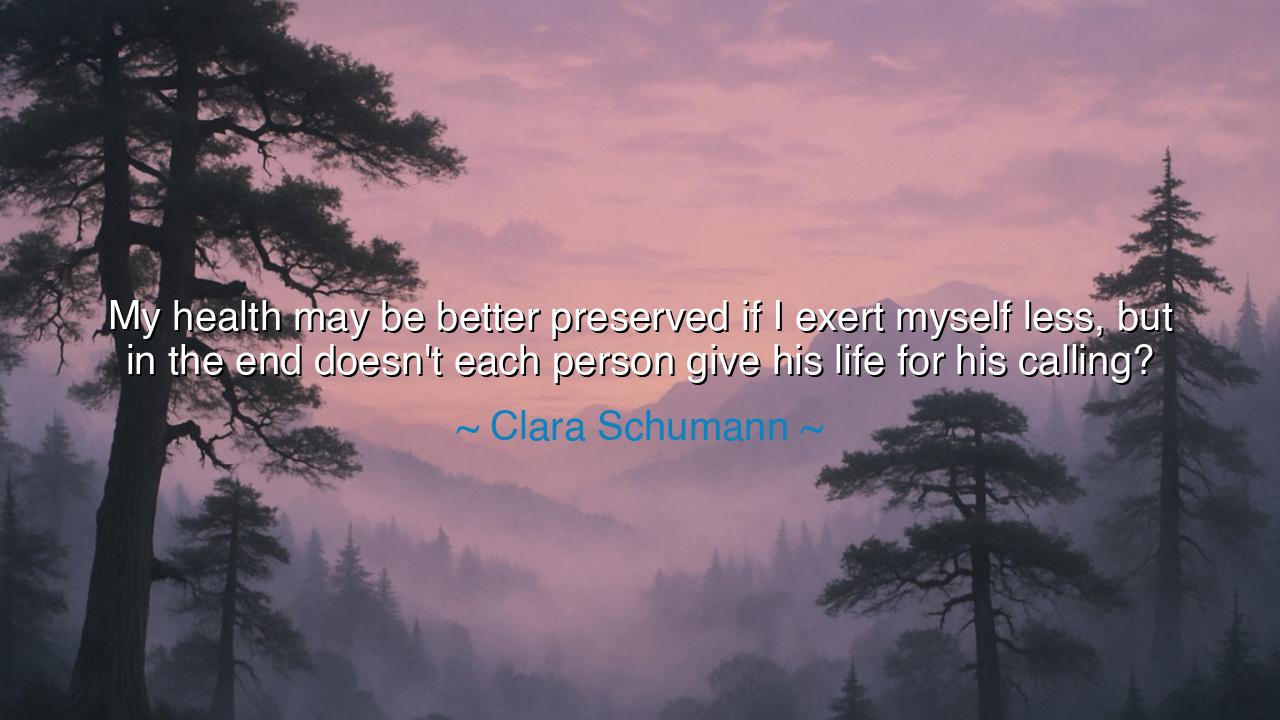
My health may be better preserved if I exert myself less, but in
My health may be better preserved if I exert myself less, but in the end doesn't each person give his life for his calling?






The words of Clara Schumann, “My health may be better preserved if I exert myself less, but in the end doesn’t each person give his life for his calling?” rise like a symphony of courage and devotion — a hymn to the sacred union between purpose and sacrifice. In them, Schumann captures one of the deepest truths of the human spirit: that to live fully is to give oneself wholly to the work one was born to do, even at the cost of comfort, ease, or even life itself. Her words are not spoken in recklessness, but in reverence — a recognition that passion, not preservation, is the heartbeat of a meaningful existence.
The origin of this quote comes from the diary of Clara Schumann, the celebrated pianist and composer who lived in the shadow and the light of one of the most demanding callings in history — the life of an artist. Married to the genius Robert Schumann, burdened with motherhood, and often wracked with illness and exhaustion, she continued to perform across Europe to support her family and uphold the legacy of their music. Her words reflect both her exhaustion and her resolve: she knew that she could protect her health only by silencing her art — and that, she could never do. For music was her soul’s breath, and to deny it would be a slower death than any physical decline.
To say that “each person gives his life for his calling” is to speak of the ancient law of devotion — the law that every great life must pay a price. The philosopher Socrates gave his life for truth, the soldier for duty, the healer for compassion, the artist for beauty. The body may weaken, the flesh may ache, but the spirit burns brighter the more it is consumed by purpose. Clara Schumann’s statement stands among the timeless echoes of those who understood that immortality is not found in longevity, but in legacy. She did not fear that her work would shorten her years; she feared only that fear itself would silence the music within her.
History is rich with such examples. Consider Florence Nightingale, who, like Clara, sacrificed her health to serve her calling. In the filth and chaos of the Crimean War, she labored day and night among the wounded, breathing disease and despair, yet she would not rest. “While they suffer, how can I sleep?” she once said. Her health broke, but her spirit changed the course of history, birthing modern nursing and giving dignity to millions. Like Clara Schumann, she understood that to preserve life without purpose is a form of death, while to lose oneself in service is to become eternal.
Schumann’s reflection also reveals a deeper spiritual truth: that health and purpose are not always in harmony, and sometimes the soul must overrule the body. Modern wisdom teaches self-care and moderation, and rightly so; but ancient wisdom teaches that when a calling touches the heart, one must sometimes go beyond the limits of comfort to fulfill it. The saint, the poet, the inventor — all live with a sacred tension between preservation and passion. To follow one’s calling is not to destroy the body heedlessly, but to accept the cost of greatness with serenity. The candle gives light because it burns.
There is a heroism in these words — not of conquest, but of endurance. Schumann does not boast of sacrifice; she simply acknowledges it as the price of authenticity. The true artist, like the true teacher, doctor, or builder, works not for reward but because they cannot not work. Their calling is their compass, their burden, and their joy. And though it may shorten their years, it deepens their days. For what is the value of long life if lived half-awake, unclaimed by passion or purpose? Better a life of fire than one of idle breath.
The lesson of Clara Schumann’s wisdom is clear and noble: find your calling, and serve it with your whole being — but do so with awareness, not recklessness. Care for your health, but do not let fear of loss rob you of greatness. Rest when needed, but never let rest become retreat. If your heart burns for something — to create, to serve, to heal, to build — let that flame guide you. For though it may consume you, it will illuminate the world.
So let these words be carried as a timeless teaching: each soul must give something of itself for its purpose. Some give time, others health, others peace — but all give love. Clara Schumann’s voice reminds us that to live nobly is not to avoid the cost of life, but to pay it willingly, knowing that in giving ourselves to our calling, we are not diminished, but fulfilled. The body may tire, but the soul, once awakened by devotion, lives forever in the music it leaves behind.






AAdministratorAdministrator
Welcome, honored guests. Please leave a comment, we will respond soon